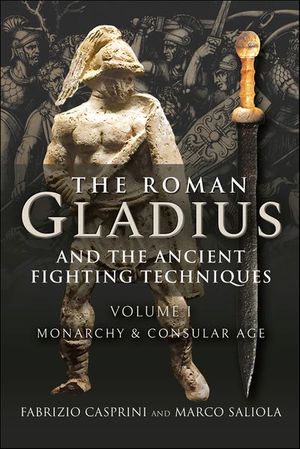The Roman Gladius and the Ancient Fighting Techniques
Marco Saliola Follow this author
Follow this author
Published by Pen & Sword Books
The backbone of the Roman army was the infantry, armed with a javelin, or pilum, and sword, or gladius. This study investigates not just the weapon itself, and its design and manufacture, but how the sword was originally conceived and how it was employed on the battlefield as an expression of the Roman state. The authors start examining the early swords employed across the Italian Peninsula during the Bronze Age and how these evolved into the gladius, which itself changed in the period of Monarchy with the introduction of the cross-hilt. During Rome’s Consular period, the gladius changed again, and, over time, both the length of the blade and its width were altered. Relying exclusively on historical and archaeological evidence, The Roman Gladius and the Ancient Fighting Techniques shows how the Roman army developed into a highly disciplined body and how fundamental the gladius was to its method of fighting. It also shows how the combat techniques of the Romans evolved as did those of their enemies. The training methods and tactics of the Roman infantry are fully explored and its performance at some of the great battles of the monarchical and consular periods are examined as the area under Roman rule fluctuated with victory or defeat. For the Roman people, the gladius was the object that better than any other showed their identity, since it was a weapon that accompanied the history of the Roman people from its earliest days, changing in shape and design as it was adapted to the varying social, political and military needs. The Roman Gladius and the Ancient Fighting Techniques is the most comprehensive study of this hugely important weapon, which also provides the reader with a complete overview of Roman society, which in this first volume is treated until the end of the Consular period. The book is richly illustrated throughout with drawings and photographs of original weapons and equipment.
BUY NOW FROM
COMMUNITY REVIEWS

